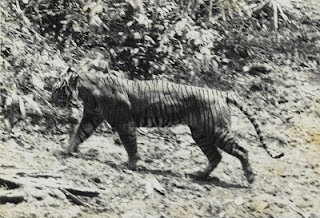Tiger Island!
Tiger Island is a BBC Natural World documentary following Panthera’s CEO and tiger expert, Dr. Alan Rabinowitz, as he investigates a controversial project to rehabilitate and release conflict tigers in Sumatra.
Fewer than 3,200 tigers exist in the wild today, with just 400-500 Sumatran tigers remaining. To save them, we need your help. Make a contribution to Panthera’s Tigers Forever program now to ensure the future of the world’s endangered tigers.
donate now
donate now
About the Documentary
On July 26th, 2012, the BBC 2 Natural World documentary Tiger Island aired for the first time in the United Kingdom. This film follows Panthera’s CEO and world renowned tiger expert, Dr. Alan Rabinowitz, as he travels to Sumatra to investigate a controversial project working to rehabilitate and release ‘conflict tigers’ back into the wild. Travel with Dr. Rabinowitz as he visits a ‘sanctuary’ for conflict tigers in southern Sumatra and learn what he discovers while monitoring tigers released back into the wild. Find out if this new and radical approach to tiger conservation could put tigers and local villagers in harm’s way or be a tool used to help save the Critically Endangered Sumatran tiger from extinction.
Tiger Island addresses the controversial question of what to do with conflict tigers after they have fed on local livestock, or worse, injured or killed local villagers. Many times, these conflicts end in a death sentence for tigers. This film explores a new capture-rehabilitate-release strategy to help protect the dwindling Sumatran tiger population with ‘The Indiana Jones of Wildlife Protection,’ Dr. Alan Rabinowitz.
Learn more about Tiger Island, a Mike Birkhead Associates film.
Tiger Island will premier in the United States on Animal Planet. Check back with us for details.
Listen to Dr. Rabinowitz’s interviews on Tiger Island:
- PRI’s The World: ‘A Controversial Wildlife Refuge on Tiger Island’
- BBC's Midweek Radio 4 program
- BBC's Up All Night Radio 5 program
Behind the Scenes and Other Sumatra Photos
Saving the Sumatran Tiger
Today, it is estimated that between 400-500 wild Sumatran tigers remain. A main cause of the decline in Sumatra’s tiger populations is habitat loss and fragmentation of once wild areas for agriculture and other developments, including monocultures for oil palm, coffee and pulp and paper. Growing developments like these and increases in human populations have forced the Sumatran tiger into closer contact with local communities, often leading to human-tiger conflicts. In retaliation, many Sumatran tigers are hunted by local villagers. A lack of natural prey like deer due to overhunting by humans is also forcing tigers to pretty on domestic animals, fueling human-tiger conflicts. The Sumatran tiger is also targeted for its valuable skin and body parts that are sold on the illegal wildlife market and used for traditional medicinal remedies across Asia.
Panthera and Save the Tiger Fund (STF) are rolling out the Tigers Forever program to protect breeding tiger populations in high priority areas across the tiger’s range, including on the island of Sumatra, by carrying out science-based monitoring and measurement of tiger and prey populations. Due to widespread poaching, Panthera’s conservation efforts also focus on supporting law enforcement patrols that secure tiger habitat and combat poachers, including using informant networks to track down and arrest poachers.
Tigers Forever is working and establishing projects with local and international partners, including but not limited to Fauna & Flora International, Zoological Society of London and the Wildlife Conservation Society, in Ulu Masen in Aceh province, the Berbak-Sembilang Landscape in east Sumatra, Leuser Ecosystem in northern Sumatra and Kerinci Seblat National Park and adjacent protected forests in West Sumatra. Panthera also helped support the first landscape-wide survey of tigers and prey populations in Sumatra.
ThankYou!
For reading this post!


Comments
Post a Comment